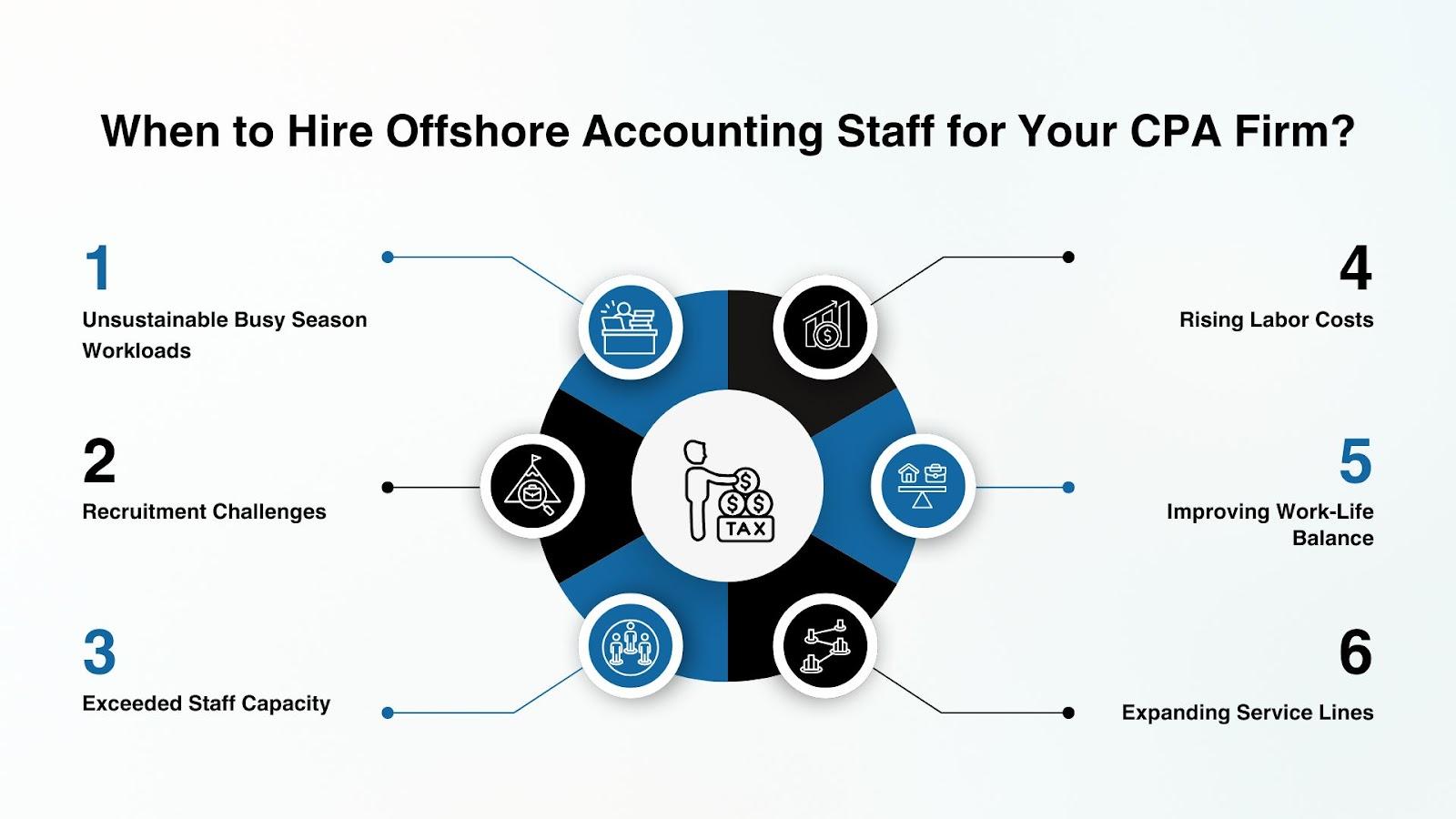Why Offshore Accounting Staffing Solutions Are Disrupting In-House Finance Teams

The world of finance and accounting is evolving rapidly, and one of the biggest shake-ups is coming from an unexpected source: offshore accounting staffing solutions.
Once seen as a cost-saving tactic for large corporations, offshore staffing has now become a strategic weapon for firms of all sizes. In 2025, these solutions aren’t just supplementing in-house teams — they’re disrupting them.
In this blog post, we’ll explore why offshore accounting staffing is transforming the finance function, how it's affecting traditional in-house roles, and what this means for the future of accounting talent.
What Are Offshore Accounting Staffing Solutions?
Offshore accounting staffing involves partnering with remote professionals or third-party firms in countries with lower labor costs — like India, the Philippines, or Eastern Europe — to handle accounting tasks. These include:
-
Bookkeeping
-
Payroll processing
-
Tax preparation
-
Financial reporting
-
Accounts payable and receivable
-
Audit support
Instead of hiring full-time in-house employees, companies leverage offshore teams that operate remotely but function like an extension of their core staff.
Why Are In-House Finance Teams Feeling the Pressure?
Traditionally, finance teams have operated in-house, often working long hours during tax seasons and financial year-ends. But in the last few years, several factors have challenged this model — and offshore staffing has emerged as the solution.
Here’s what’s driving the disruption:
🔹 1. Cost Efficiency That’s Impossible to Ignore
In-house finance staff, especially in developed countries like the U.S., UK, Canada, and Australia, come with high salary expectations, benefits, and overhead costs. Offshore professionals offer the same expertise at a fraction of the cost — often 50–70% less.
This has made CFOs and firm owners seriously reconsider their traditional hiring models.
Example:
Hiring a senior accountant in New York can cost $80,000–$100,000 annually. A similarly qualified offshore accountant might cost $25,000–$35,000 per year.
🔹 2. Global Talent Shortages
There's a growing shortage of qualified finance professionals in many countries. Universities are producing fewer accounting graduates, and many professionals are leaving the industry due to burnout.
Offshore staffing opens the door to a global talent pool — with thousands of trained accountants ready to work remotely, often with international certifications like CPA, ACCA, or CA.
🔹 3. Technology Has Removed the Location Barrier
The rise of cloud-based accounting platforms (like Xero, QuickBooks Online, and NetSuite), along with collaboration tools like Slack, Zoom, and Microsoft Teams, means there’s no technical reason to keep teams in-house anymore.
Remote and offshore staff can log in, collaborate, and deliver work in real-time, just like any on-site employee.
🔹 4. Scalability and Flexibility
In-house hiring is slow and rigid. Recruitment takes weeks or months, and once a team is hired, scaling up or down is difficult.
Offshore staffing allows firms to scale instantly based on workflow — perfect for handling seasonal demand like tax season or year-end audits.
This flexibility is a major advantage over traditional in-house models.
How Offshore Teams Are Outperforming In-House Staff
Surprisingly, many businesses are reporting that their offshore teams are not only matching but often exceeding the performance of their in-house finance teams.
Here’s why:
-
Specialization: Offshore providers often assign staff with specific skill sets for tasks like payroll, reconciliation, or tax prep.
-
Structured Processes: Top offshore firms follow strict quality assurance protocols and SLA commitments.
-
Incentivized Productivity: Offshore staff are typically motivated to retain long-term clients, leading to high accountability and performance.
What This Disruption Means for In-House Finance Teams
So, does this mean the end of in-house accounting departments?
Not quite — but it does mean a dramatic shift in their roles:
From Task Execution to Strategic Contribution
As offshore teams take over routine and repetitive tasks, in-house staff are expected to focus more on analysis, advisory, forecasting, and decision-making support.
Need for New Skill Sets
In-house accountants now need stronger communication, collaboration, and leadership skills to work with global teams and guide strategy.
Downsizing of Entry-Level Roles
Junior roles in bookkeeping or data entry are becoming less relevant locally. Instead, firms prefer to hire offshore for entry-level work, and focus local hires on mid- to senior-level strategy and client interaction.
The Hybrid Model: Offshore + In-House Collaboration
Many forward-thinking firms are adopting a hybrid model, where in-house teams and offshore staff work together in an integrated structure. This model offers:
-
24/7 productivity
-
Lower costs
-
Faster turnaround
-
Broader skill coverage
Instead of viewing offshore staffing as a threat, modern firms see it as an enabler of growth.
How to Prepare Your Firm for the Offshore Revolution
Here are a few tips for firms looking to adapt to this shift:
-
Identify processes that can be offshored (e.g., reconciliations, payroll).
-
Choose the right partner with proven accounting expertise.
-
Invest in documentation and SOPs to standardize your workflows.
-
Train your in-house team to manage remote collaboration effectively.
-
Focus local talent on client interaction and strategic insights.
Conclusion
Offshore accounting staffing solutions are no longer a cost-cutting experiment — they are disrupting the traditional in-house finance model and becoming a permanent fixture in modern firms.
Companies that embrace this change are seeing faster growth, better margins, and improved service delivery. Those that resist may find themselves left behind.
The future of finance is global, flexible, and technology-driven — and offshore staffing is right at the heart of it.
- Art
- Causes
- Crafts
- Dance
- Drinks
- Film
- Fitness
- Food
- Spellen
- Gardening
- Health
- Home
- Literature
- Music
- Networking
- Other
- Party
- Religion
- Shopping
- Sports
- Theater
- Wellness




